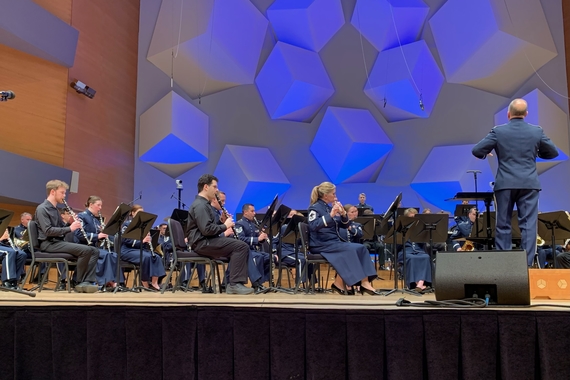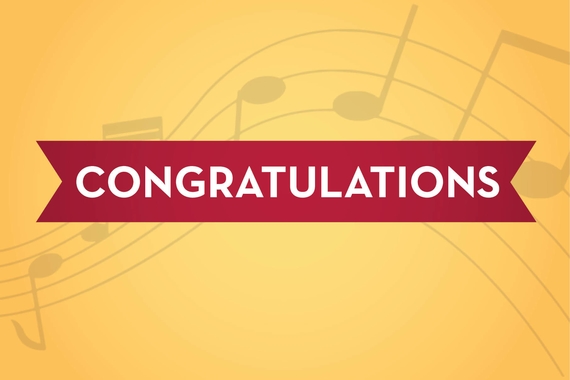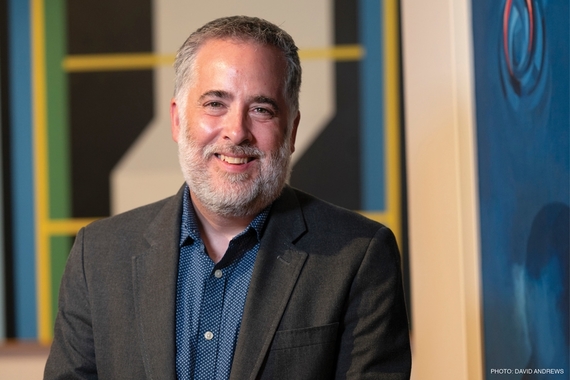Behind the Scenes of the Studio Recording Industry With Marissa Benedict, Assistant Professor of Trumpet
In addition to serving on the faculty of the UMN School of Music, Assistant Professor of Trumpet Marissa Benedict has an established career in Southern California as a freelance musician. She is Principal Trumpet of the Pasadena Symphony, Associate Principal Trumpet of the Long Beach Symphony, and an experienced studio musician who can be heard on nearly 180 motion picture soundtracks including Moana, Legally Blonde, The Polar Express, Incredibles 2, and more! We spoke with her about life in the recording industry and how she applies that experience to working with the students in her studio.
Can you share the story of how you got involved in the studio recording industry?
Being a part of the recording industry is not only an unbelievable honor; it is a long process of practicing, rehearsing, performing, networking, and staying in tip- top shape. I would say the first step that helped me become a part of the industry was going to school in Los Angeles and then staying in Los Angeles to freelance beyond my school years. You really need to have connections with other musicians and they need to know your playing and trust that you will be responsible for any given performance.
The other thing that helped me break into the business was being very versatile in all styles and genres of music. Growing up, I had playing experiences from a young age in classical music, chamber music, dixieland, big bands, and symphony orchestras. The long process is playing with others that are already playing in the recording sessions, gaining their trust and confidence that you will be a strong team player no matter what the situation and then having someone speak up for you to a contractor and recommend you. I had a colleague who recommended me for a television recording session, JAG, and after playing a few sessions my name got passed on to other contractors and so it began. I am very grateful not only for Jon Lewis in introducing me but for the opportunity to continue to be in this business.
What has been your favorite moment when recording movie soundtracks? What is your favorite soundtrack that you have performed on and why?
It’s hard to name only one favorite, it’s more like a favorite situation and time when it happened. For example, my first full motion picture that I recorded was Legally Blonde. It was fun and exciting because of it being the first time. It’s not always a favorite soundtrack but sometimes a favorite theme to a character. All that being said, a short list of favorites would be The Polar Express, all of the Spider-Man Movies, Scooby Doo, Zombie Island (my kids loved this one), Incredibles 2, Moana, Coco, War of the Worlds (2005). As I’m writing this more are coming to mind. Television shows that were my favorite were Star Trek Enterprise, Voyager and Deep Space Nine.
When you’re in the recording business you also get the chance to record for video games, singing artists, and award shows. I have played for The World of WarCraft, Minecraft, Fortnite, Call of Duty and for such artists as Maroon 5, Panic at the Disco, Bette Midler to name a few. And then every once in a while, you get to play and sideline on shows. If you ever watch the Halloween episode of Brooklyn 99, you’ll see and hear me there too. As you can see, it’s never a dull moment.
How do you incorporate your studio experience into your lessons with your students?
I think the best way that I incorporate my studio experience into my studio teaching is to make sure that my students will be prepared for anything. Because as a recording musician you’re often not seeing the music until the morning you arrive, sight-reading is of the utmost importance. Making sure they sight read something everyday, multiple times a day is very important. Initial sound production and confidence in knowing you will get a beautiful sound every time you play, no matter the length, volume or difficulty of the passage. Also, teaching them the importance of ethics, etiquette, and professionalism is very important. Mastering your instrument is important but being a team player, being on time, executing your music, these are all equally if not more important.
Is there a technique difference between studio recording and a regular stage performance?
There is definitely a difference between studio recording and live stage performance. In a live stage performance, you have usually practiced or rehearsed numerous times before the performance. You are also surrounded by other musicians and it can feel more comfortable. Human mistakes are more forgivable (to a point they are in recording) and knowing that when the red light comes on (recording is starting) you have to be silent, not move much, and play with no hesitation or fear. Once you do it for a while it does become more comfortable but sometimes you might have been sitting for a while while another section is being recorded. You always have to be ready to play whatever is in front of you at any moment and maybe multiple times. In a live performance, you have rehearsed multiple times but there is only one performance.
What’s a typical day recording in the studio like?
Days in the studio can look different and be different every time, but basically, you show up and need to leave plenty of time to get there. Being late is not an option unless an act of God happened on your way to work. If you’re not in your chair when the session begins you may not be back the next time.
Once there, your music is on the stand and you look through it to see what the day might look like. It might be a lot of tacet sheets (pieces you don’t play on) or more action related music, or a mix. It just depends on the movie. For a major motion picture, there is usually a week (Monday-Friday) of double sessions which means 10-1 and 2-5. Of those five days, there could be complete days when you don’t play a note. Which means you go home and practice since you didn’t play anything. The next day could be the same, or could start with the hardest cue. So basically, you need to be prepared for anything at any time.
Are there any notable relationships that you have developed with other professional musicians in the industry while in sessions?
I have made numerous friends over the years that I consider notable but not many people know the names. Luckily, the industry has finally decided to list the musicians in the credits now at the end of a movie, so friends and family can finally see our names. During sessions, the composers will often come back and thank us and take pictures with us which really feels good. I have met all the composers I’ve worked with (John Williams, Michael Giacchino, James Newton Howard, Danny Elfmanm, James Horner, Mark Isham, Randy Newman) but to say we are friends would be a stretch. I do know they appreciate the musicians bringing their music to life.
What advice would you give to students looking to work in the studio recording industry?
I have colleagues that would discourage their students from trying to enter the business. There’s not as much work as there used to be and it can be difficult while waiting to get your chance. But, I would never tell a student not to follow their dream or choice of work. It is definitely possible but they need to be realistic and really have the desire to put the necessary work in, like any high valued job. If a student wants to try to enter the recording industry they should live in or near a city that does recording. Most motion picture recording happens in Los Angeles, but there are other cities like Atlanta, Nashville and major orchestras now do some recording for motion pictures too. Know who already is in the business and make contact with them. Don’t assume you’ll automatically start the day you arrive because you need to make connections and show them you can not only play, but that you’ll work hard and be fun to work with.
Other advice I would give to students looking to work in the recording industry would be to work hard and be a good person. No matter how good you are on the trumpet, if no one likes you, you won’t work. The same rules that you follow for most any job as far as ethics go. Be on time. If you mess up, own it and apologize. Don’t gossip. Be a team player. Know when to lead and when to follow. Practice and don’t make excuses. This might sound harsh to some, but in this business, time is money and there is no time to waste. It really is a fun, rewarding business.


